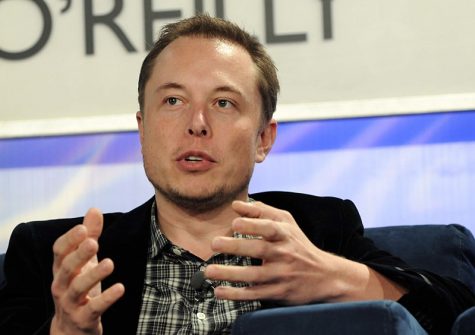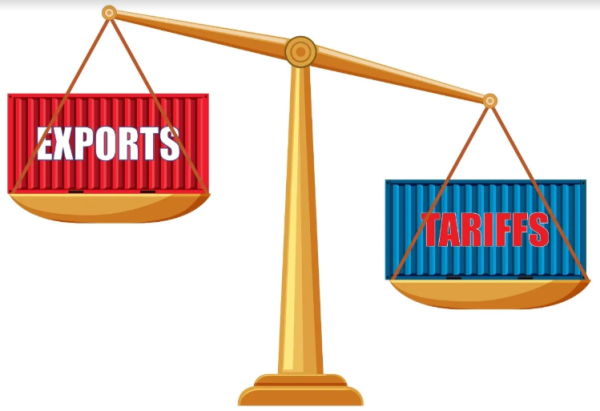Socialism – Opposing Sides
The following articles are two separate pieces written by both Witness opinions writers, Ayden Fisher and Zac Bestwick respectively. Articles such as these are meant to express opposing arguments on a certain subject in order for Weddington students to gain a better understanding of the issue itself.
[Democratic] Socialism, By Ayden Fisher
In the past few years, we’ve been seeing increased support for the United State’s adoption of socialistic principles, dubbed as democratic socialism. This is not a new thing. We’ve seen large-scale movements for socialism all the way back to the early 1900s. I have three main problems that hold me back from accepting this “new socialism.” Without further ado, here are my three holdups:
What’s the difference between socialism and democratic socialism?
Democratic socialism is put out there as a “new” type of economic system that gets a bad rap because of similar socialistic failures. It is branded as something completely separate from pure socialism. To most people, democratic socialism means free college, free medical care, and high minimum wages. This is one of the things that makes it so attractive to the masses; all those policies sound really nice on paper. However, democratic socialism is more than that. Democratic socialism, according to the DSA (Democratic Socialists of America), is a system is set up so that local governments, supported by its citizens, will play a large role in business decisions. The idea is based around how the workers are just as valuable or more valuable than the owners/managers of firms. In other words, it makes the assumption that the low skilled workers deserve as much say in the company’s management as the owners who came up with the ideas, put together the connections, and invested/risked their livelihood for it. Regardless of how you feel about how where the value of the business’s survival falls, with this definition, democratic socialism is still socialism. It is the idea that the workers should be largely involved in the means of production through democratic principles. So if democratic socialism is the same as prior socialism, then it begs the following question:
Where are successful socialist countries?
A successful example of the [democratic] socialist system is a reasonable request before our adoption of it. Especially with socialism’s terrible track record in Venezuela, Spain, and elsewhere. The Soviet Union and Spain’s initial governments resembled democratic socialism, but they clearly didn’t work out after their quick collapses into communist systems. The most widely claimed example of successful socialism is the Nordic countries in Europe. However, while they do have high taxation rates and generous social safety nets, they do not have socialist systems. Scandinavian countries, on the contrary, are widely free-market systems. Sweden has school-choice. Norway has private social security. And not a single one of them has a minimum wage! Even Lars Rasmussen, the Prime Minister of Denmark, disagreed with assumptions of Nordic socialism when he stated: “Denmark is far from a socialist planned economy. Denmark is a market economy.”* In fact, in recent years Scandinavian countries have even been moving further away because they’ve been unable to pay for their current social programs even with their high taxes. So, where else can we look for socialist successes?
What’s wrong with capitalism?
When introducing a whole new idealism for the world’s largest economy, you also have to expound what is wrong with the current system: capitalism. Capitalism has been the most successful economic system, ever. Every country that has adopted free-market principles has seen dramatic increases in wages and education. Take China for example, which is currently booming after loosening up on government control. In contrast to what democratic socialist leaders tell us, capitalism has been and still is a great system. Our standard of living continues to rise while we work fewer and fewer hours. Even the poorest in the United States have cell phones and cars. Competitive, free markets are good. It is unbelievable how many statistics have been twisted to try to discredit capitalism. Yet in actuality, it has been extraordinarily successful and rewarding to all of us- and especially those who work smart and hard.
We often get caught up in searching for the perfect utopian solution to the world. Unfortunately, there is no “perfect society where everyone is equal.” Claims that there is one are based on ignorance. Even if democratic socialism were a perfect system, I can’t foresee the American people adopting it. Currently, 19%** of the population trust the government. In that, we cannot expect the people of the U.S. to allow a government, no matter how democratic, to manage what businesses can and can’t do, what you can spend your money on, and in general, decide what is best for you. I believe in freedom- freedom to decide what you think is best as long as it does not interfere with another’s freedom to choose. That is not what socialism gives us.
If you disagree and have good answers to my questions, please leave a response below. I’d love to hear from you and I am always open to being wrong.
Useful sources:
*https://www.thelocal.dk/20151101/danish-pm-in-us-denmark-is-not-socialist
**https://www.npr.org/2015/11/23/457063796/poll-only-1-in-5-americans-say-they-trust-the-government
Socialism and the Future of the United States, By Zac Bestwick
A political curse word since the early 1900s, socialism is an ideology that is frequently misrepresented in modern discourse. As defined by Merriam-Webster, socialism is ‘any of various economic and political theories advocating collective or governmental ownership and administration of the means of production and distribution of goods’. As with any form of government or economic policy, socialism doesn’t exist in its purest form anywhere on earth, perhaps for the best. Even the United States is far closer to socialism than many imagine.
Socialism is often confused with communism, but the big difference between the two is that communism requires enforcement by a totalitarian government, which is why socialism so often gets a bad wrap. In the United States, we’ve avoided communism like the plague since before the Cold War. While the system of communism never actually threatened to impose itself over America, we were wise to understand that it conflicts with our values and way of life. Any totalitarian system means giving up the freedoms we are so proud to have earned. Socialism, however, does not require the imposition of any new forms of government, meaning it is compatible with democracy. In the United States, softer forms of socialism have existed since our current constitution was ratified. The levying of taxes and military drafts are both examples of the government collecting capital for its own use and the public’s benefit. More modern examples include the FDIC, through which the government insures our bank accounts. Even public schools can thank socialism for their existence. Any program in which a government collects taxpayer dollars relies on some form of socialism. Where we draw the line is important, but the Constitution exists to protect our democratic institutions regardless of our economic positions.
Modern political figures such as Bernie Sanders and Alexandria Ocasio-Cortez are frequently lambasted by conservatives for bringing their socialist views into the forefront of the national conversation on healthcare, but their positions aren’t as radical as one might think. During the 2016 election, Bernie Sanders ran on socialist policies like tuition free college and universal healthcare. While such undertakings would require significant tax hikes, these policies would also eliminate crippling student loan debt and debilitating healthcare costs. Canada has had universal healthcare (excluding coverage of prescription medication ) since the 1980s, and satisfaction appears high. (The United Nations World Happiness Index ranked Canada at #7 out of 156 countries. The top spot went to another universal healthcare nation, Finland, but a lack of reform is currently harming the Finnish economy.) Universal healthcare in the United States wouldn’t be easy to implement, but if handled properly it could relive many Americans by removing the price tag from their human rights. Ocasio-Cortez’s most well known socialist venture is the Green New Deal, an environmental reform program I wrote about in February. The Deal aims high, but its supporters hope it could totally remove or replace all fossil fuels from the U.S. economy. Conservatives decry the program as an attack on American industry, but environmental concerns might soon prove threatening to national security. According to the Intergovernmental Panel on Climate Change, climate change could be irreversible in just a decade. Other American industries like agriculture require the current climate to operate, and with more efficient forms of energy becoming increasingly efficient, perhaps regulation on fossil fuels would be a necessary use of government influence. High taxes and firm regulations make socialist policies a hard sell, but certain changes are necessary, and cannot be left up to the natural sways of the economy.
Conservatives don’t, as it may seem, avoid socialism because they see it as a path to communism. Conservatives avoid socialist policies because of their permanence. During the Great Depression, President Franklin Roosevelt pushed a slew of policies as part of his New Deal. Despite his relative success in saving capitalism and the economy, critics called Roosevelt a socialist, compelling the Supreme Court to shut down some of his earlier programs. Among the New Deal’s many changes to the American economy, perhaps the most notable was the Social Security Act, a program that collects a portion of taxpayers’ earnings to fund retirement pensions, unemployment insurance, and welfare. Social Security has stood the test of time, lasting from 1935 to present day. Conservatives know that socialist programs like Social Security are very popular, and become systems that people rely on. The case will be the same when universal healthcare is finally instituted in the United States: Americans will enjoy the program’s benefits, rendering all attempts to repeal such a system impossible. We’ve seen this on a smaller scale with the Affordable Care Act (Obamacare) as Americans realize the positive effects of widely-available, affordable healthcare.
Despite the roadblock of misrepresentation, socialism will only become more prevalent in the United States in the coming years. The next president, regardless of whether the incumbent is re-elected or not, will most likely be a democrat. If history repeats itself, this president will likely enjoy a largely democratic congress. Moderate democrats remain, but as healthcare becomes the factor most people vote by, universal healthcare seems inevitable. Socialism is a concrete and effective solution to many American problems, both present and future. If handled properly, democracy and socialism can be the political-economic duo that keeps America great.











Ayden Fisher • May 24, 2019 at 6:46 pm
A response to Abby:
First I’d like to address, yes, I did make an exaggerated claim. I was wrong to state that the poorest in the United States have cars. My original intention would be better phrased: “We still have poverty, but our poor are some of the richest poor people in the world.” Apologies. However, when I root positively for capitalism, I am not rooting for what we currently have. I do not believe lobbying is capitalistic or moral. You cannot take something done by the government and blame it on capitalism. Furthermore, I think if we got rid of lobbying our society would be more productive and address pressing issues like climate change.
Abigail Martin • May 24, 2019 at 9:31 am
Ayden– Personally, I am a proponent of a carefully implemented and modern version of socialism, and I get your concerns. Why fix something if it isn’t broken? Well, in my opinion, capitalism is a broken system. You mention in you article that capitalism outweighs socialism in the economic benefits, but these ideas of economic prosperity are often, much like the so called “twisted statistics” you mention, inaccurate. Your ideas on the spread of wealth in capitalist countries appears to be over-generalized, especially in your statement about “the poorest… have cell phones and cars.” If this is true, then why do we see inner-city homeless populations sleeping on the sidewalks instead of their cars? The answer is because they probably don’t have one. Most of the perceived wealth in the United States is condensed into the top 5% of incomes, making us notorious for our uneven distribution of wealth. Now, you also mention the unlikeliness of socialist policies being implemented due to high government distrust. I do agree that distrust in the government is high, but I think the reason for that is capitalist policies. The control private business has over legislation is unsettling, with hordes of money flowing into legislator’s bank accounts to keep pro-business legislation protected. If we could begin to restrict business influence in the government lobby and let the people, not a CEO, appeal to the government, then we would be taking a step in the right direction and increasing the public’s faith in the government. By decreasing the power of big business, we can bring power back to the people. To be clear, though, I do not endorse a complete shift from capitalism to socialism, but I do think it should not be dismissed completely.